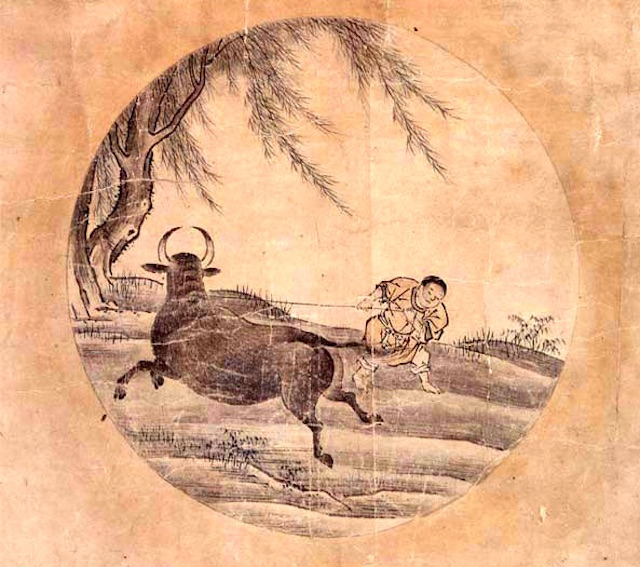In the 12th century, Zen master, Kakuan, painted 10 pictures illustrating a boy’s search for a bull.
Zen often uses simple stories to illustrate important points—this series of pictures depicts the stages someone might pass in search of their own true nature.
The 10 phases lend themselves to the stages we might pass in our yoga journey.
They provide a good map to show us where we are and where we are heading.
1. Searching
At this point we may feel dissatisfied. Activities which brought pleasure in the past seem empty and we’re not sure what to do next.
2. Finding traces
We realise that we may have to step outside our comfort zone and start looking for solutions. Perhaps we try a yoga class and wonder if this might be what we’re looking for. A lot of time is spent thinking about the problem and wondering if we’re doing the right thing.
3. Discovering
In the absence of answers, we start going to yoga more regularly. We start looking forward to classes and notice that we’re feeling better on the days we practice and that we feel relaxed and sleep well after practicing.
4. Catching
Now the benefits are kicking in and yoga becomes a priority.
Unexpectedly, we realize that yoga might be the missing piece of the puzzle. This stage takes discipline, in the same way the bull-herder in the Zen parable may need to use a rope and a whip to catch the bull.
Maybe we start waking up earlier to go to classes before work or we decline a drink in the evening so that it doesn’t spoil the next day’s class.
Difficult postures are getting easier.
5. Taming
The yogic discipline is starting to pay off. We may go through stages where we have to push ourselves to practice and develop and others when practice is flowing easily. At times we may feel something is out of balance as we are doing too much or too little. It could be an arduous process while we change and adapt to find balance again.
Discipline is an important key.
6. Coming home
A point is reached where the balance is right.
We feel good, we practice and rest when necessary. There is a good balance between flexibility and strength, and we can start and stop when we need to. There is ease and enjoyment and we congratulate ourselves.
7. Bull forgotten
This may be a stage when there is contentment and we have stopped seeking.
Another expression may be that we feel bored. This is a cue to reconnect with the initial purpose and continue to develop. It is important here to find like-minded friends to practice with or perhaps to find some new inspiration, like a new teacher.
8. All is forgotten
Here we reach a level of detachment. Practice is going well—we’re not forcing ourselves to practice or to rest. There is balance, ease, flow and development. We don’t have to think about it anymore, because we’re not trying to do anything.
9. Returning to the source
Recalling the beginning of the search and the motivation to start, we realize that we had exactly what we were looking for all along.
These gifts were just waiting to be uncovered. We may feel gratitude to ourselves, colleagues and teachers who have been on the journey.
10. Entering the market place
The benefits of yoga practice overflows into the rest of our lives. It may be easier to cope with stress, health is improved and there is more ease and happiness.
Perhaps through this process we have changed our lives to become more authentic and reflective of our new interests and we are able to participate in our lives with more enthusiasm, focus and detachment.
We may pass one or all of these stages a number of times in our lives. It is a spiral process rather than a straight arrow—and nothing is ever lost. We may get stuck at a particular point a number of times before we can pass to the next.
Do you find yourself getting stuck at a particular place? Where are you now?
r~
Love elephant and want to go steady?
Sign up for our (curated) daily and weekly newsletters!
~
~
Author: Karen Verhoog
Editor: Ashleigh Hitchcock









Read 0 comments and reply